Choosing the right online learning platform for you can be a real challenge, but it’s an important choice that can significantly change your life.
When looking at the best online course platforms, the comparison of Udacity vs Coursera instantly comes up.
So, which platform is better, Udacity or Coursera?
In this guide, we delve into the comparison of two prominent online learning giants, Udacity and Coursera. Whether you’re aiming to acquire specialized skills for your career or explore a broad spectrum of academic subjects, this comprehensive examination will assist you in making an informed decision.
Join us as we explore the courses, certificates, mobile accessibility, and much more to help you pave your path to success in the online education landscape.
My Udacity vs Coursera review is full and in-depth, but if you’re in a rush the headlines are:
Udacity
Udacity is a career-focused online learning platform known for its practical courses and Nanodegree programs. It offers flexible self-paced learning with industry collaboration, suitable for tech and career-oriented skills. Udacity’s mobile app supports on-the-go learning, but it may have limited academic offerings and higher costs compared to some alternatives. Ideal for hands-on learners aiming to excel in their careers.
Coursera
Coursera is a diverse online learning platform known for its academic courses, prestigious university affiliations, and extensive course catalog. Its mobile app enhances accessibility, but some courses and certificates come with costs. Ideal for those seeking academic and professional development in various disciplines.
Udacity and Coursera in a Nutshell
About Udacity
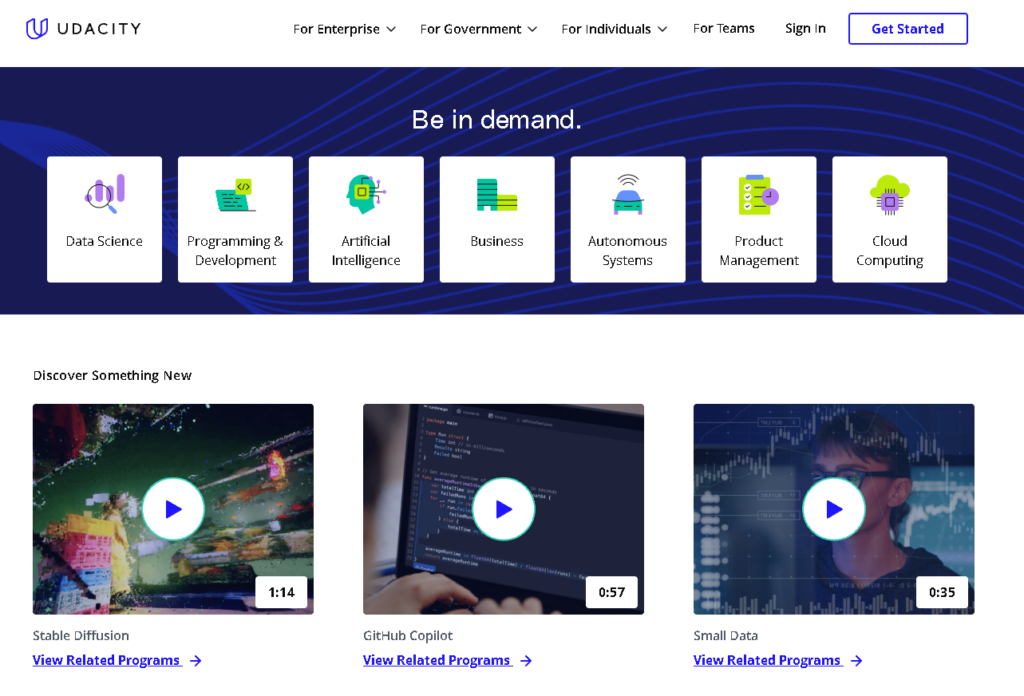
Udacity, founded in 2012, has emerged as a leading force in the online education arena, revolutionizing learning with its practical, job-focused approach.
Offering a diverse range of courses and specialized Nanodegree programs, Udacity empowers learners worldwide to acquire real-world skills, often in collaboration with top industry experts and universities.
Their emphasis on self-paced learning, robust career services, and global reach makes Udacity a compelling choice for those seeking to upskill or transition into high-demand industries.
Furthermore, their commitment to inclusivity and innovative learning tools ensures that quality education is accessible to a wide range of individuals, setting the stage for a thorough Udacity vs Coursera comparison in the subsequent sections.
About Coursera
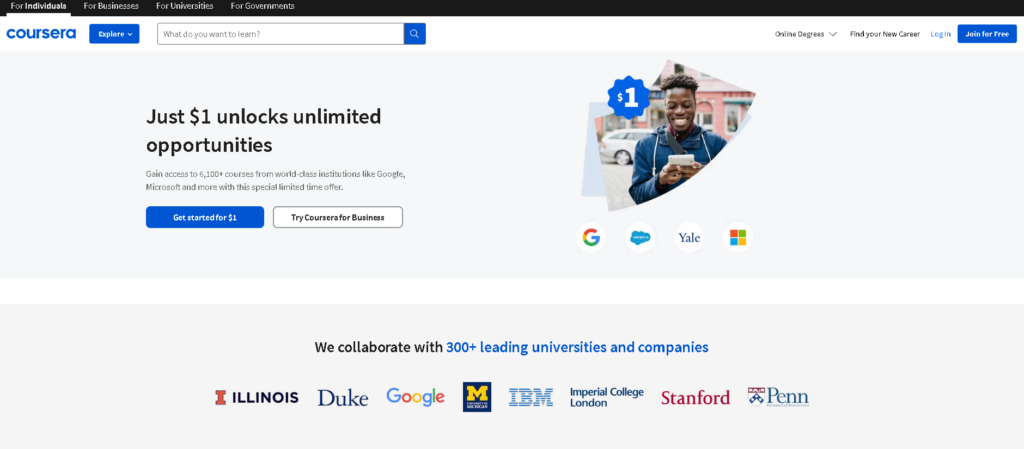
Coursera, a prominent name in the realm of online education, has been reshaping the way people learn since its establishment. Founded in 2012 by Andrew Ng and Daphne Koller, Coursera quickly gained recognition for its extensive catalog of courses and partnerships with esteemed universities and institutions worldwide.
What sets Coursera apart is its commitment to offering a broad spectrum of courses, ranging from traditional academic subjects to cutting-edge technology and business disciplines.
Learners can choose from individual courses, specializations, and even full-degree programs, making Coursera a versatile platform for both skill acquisition and formal education.
With a focus on flexibility, high-quality content, and a thriving community of learners, Coursera has earned its place as a key player in the online learning landscape.
As we delve deeper into this comparison of Coursera vs Udacity, we’ll explore various aspects, including courses, instructors, features, pricing, and more, to help you make an informed decision for your educational journey.
Udacity vs Coursera Courses
When it comes to choosing an online learning platform, the courses offered are often a crucial factor in the decision-making process. Both Udacity and Coursera boast extensive course catalogs, but they have distinct approaches to education.
My Top Tips for Finding the Best Courses
- Define Your Learning Goals: Clearly state your educational objectives. Are you looking to acquire specific skills, explore new subjects, or advance your career? Defining your goals will guide your course selection.
- Review Course Descriptions: Carefully examine course descriptions, including learning outcomes, prerequisites, and course format. Ensure that the course content aligns with your objectives and that you meet any necessary requirements.
- Check Reviews and Ratings: Utilize user reviews and ratings to assess course quality and relevance. Feedback from previous learners can provide valuable insights into the course’s effectiveness.
- Explore Instructors’ Credentials: Research the instructors’ backgrounds, qualifications, and industry experience. Experienced instructors often enhance the learning experience by sharing practical insights.
- Examine Course Syllabi: Dive into course syllabi to understand the topics covered. Verify that the syllabus matches your learning goals and interests.
- Take Advantage of Free Trials: Before committing, use any available free trials or course previews. This allows you to sample the course content and evaluate its suitability.
- Seek Recommendations: Don’t hesitate to seek recommendations from peers, mentors, or online communities. Others’ experiences and insights can help you discover valuable courses and avoid those that may not meet your expectations.
Udacity Courses
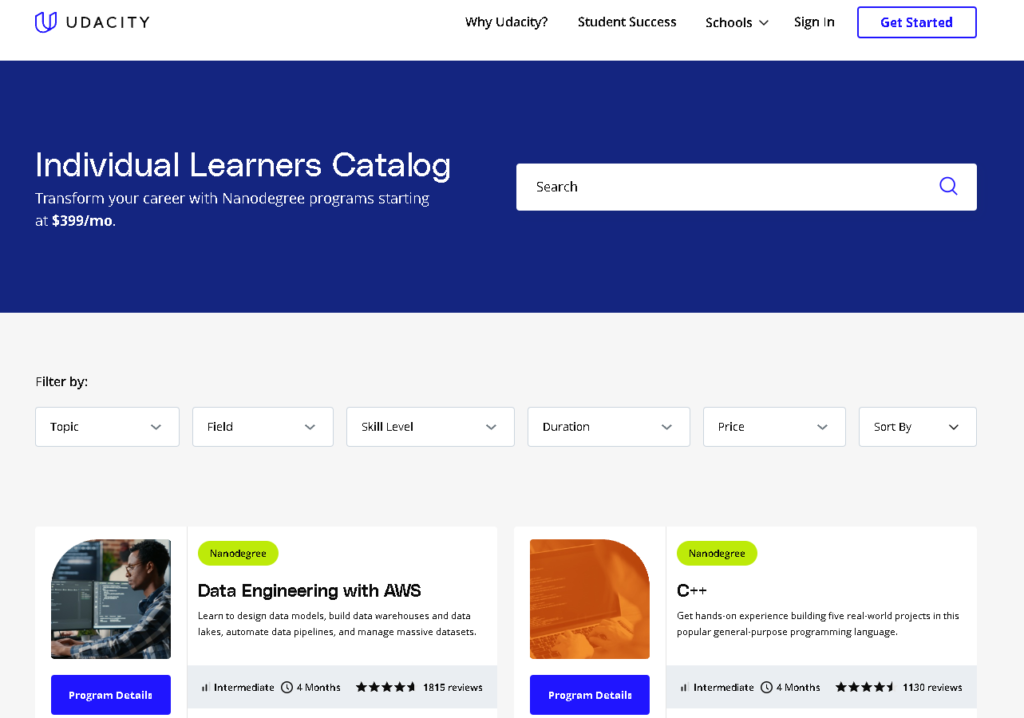
Udacity is renowned for its Nanodegree programs, which are immersive and focused on practical skills. These programs are designed to equip learners with job-ready expertise in fields such as artificial intelligence, data science, digital marketing, and more.
Udacity’s courses are often project-based, allowing you to apply what you’ve learned in real-world scenarios. This hands-on approach is a hallmark of Udacity’s teaching style, providing tangible skills that can impress potential employers.
While Udacity primarily specializes in technology and business-related courses, they do offer a variety of other subjects to cater to a broader audience.
Best Udacity Courses

- Data Analyst Nanodegree: This program equips learners with essential data analysis skills using Python, SQL, and data visualization tools. It’s ideal for those interested in a career in data analysis.
- Machine Learning Engineer Nanodegree: This Nanodegree focuses on machine learning, covering topics such as supervised and unsupervised learning, deep learning, and natural language processing. It’s suitable for aspiring machine learning engineers.
- Front End Web Developer Nanodegree: Designed for web development enthusiasts, this program teaches modern web development technologies, including HTML, CSS, JavaScript, and responsive web design.
- Artificial Intelligence for Trading Nanodegree: This program delves into the world of algorithmic trading and quantitative analysis, offering a practical approach to using AI in the financial industry.
- Full Stack Web Developer Nanodegree: Aimed at aspiring full-stack developers, this Nanodegree covers both front-end and back-end development, teaching skills like Python, JavaScript, and databases.
- Digital Marketing Nanodegree: Ideal for marketing professionals and those looking to enter the field, this program covers topics such as search engine optimization (SEO), social media marketing, and email marketing.
- Self-Driving Car Engineer Nanodegree: If you’re passionate about autonomous vehicles, this program provides hands-on experience in building self-driving car systems, including computer vision and deep learning.
Coursera Courses

Coursera, on the other hand, offers a more diverse range of courses, covering not only technology and business but also traditional academic disciplines.
You can find courses on history, philosophy, and even music theory alongside cutting-edge topics like machine learning and blockchain.
Coursera’s courses are often created in partnership with top universities and institutions, ensuring academic rigor and high-quality content.
Whether you want to earn a degree, a specialization certificate, or just explore a subject of interest, Coursera likely has a course for you.
Coursera Best Courses
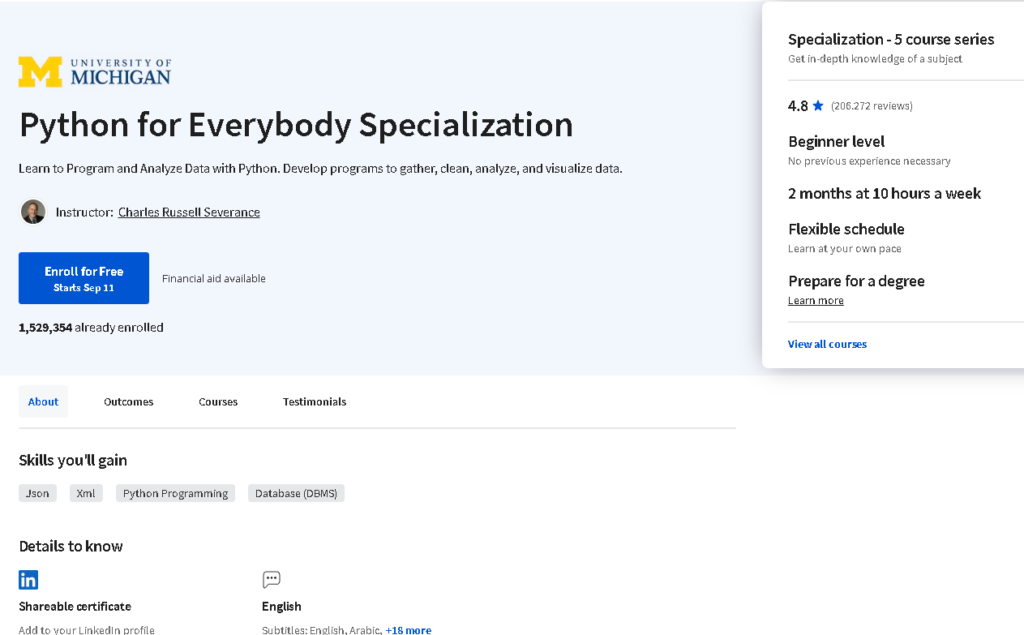
- Machine Learning (by Stanford University): Taught by renowned professor Andrew Ng, this course provides a comprehensive introduction to machine learning. It’s a favorite among those looking to delve into this field.
- Google IT Support Professional Certificate: Developed by Google, this program offers training in IT support, preparing learners for entry-level IT roles.
- Python for Everybody (by the University of Michigan): A beginner-friendly course that teaches Python programming from the ground up, making it suitable for those new to coding.
- IBM Data Science Professional Certificate: This program covers key data science topics, including data analysis, machine learning, and data visualization, helping learners build a strong foundation in data science.
- Learning How to Learn (by the University of California, San Diego & McMaster University): Designed to improve learning efficiency, this course provides valuable insights and techniques for effective studying.
- Financial Markets (by Yale University): Led by Nobel laureate Robert Shiller, this course offers a deep dive into financial markets, making it ideal for finance enthusiasts and professionals.
- AI for Everyone (by deeplearning.ai): Created by Andrew Ng’s deeplearning.ai, this course demystifies artificial intelligence and machine learning, making it accessible to a broad audience.
Udacity vs Coursera Teachers and Course Quality
The quality of instructors and course content is a crucial factor when choosing an online learning platform like Udacity or Coursera. Let’s delve into how these platforms stack up when it comes to teachers and course quality.
Udacity Teachers and Quality

Udacity takes pride in its approach to education, emphasizing practicality and real-world relevance.
Courses are often developed in collaboration with industry experts and renowned universities, ensuring that instructors bring a wealth of practical knowledge to the classroom.
This combination of academic expertise and industry experience helps learners acquire job-ready skills, making Udacity a strong choice for those seeking hands-on, career-focused education.
Coursera Teachers and Quality
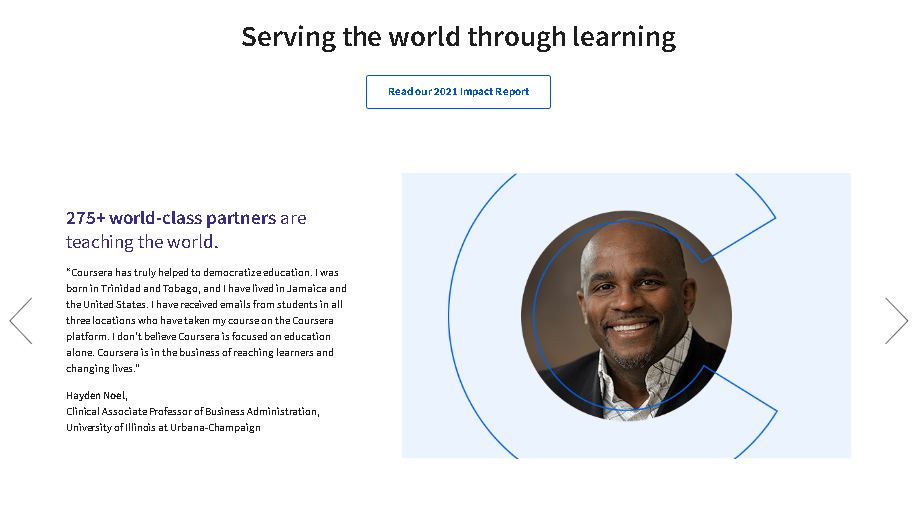
Coursera partners with prestigious institutions and professors, offering a diverse range of subjects with a strong emphasis on academic rigor.
Instructors often hail from top universities, providing learners with the opportunity to access world-class education.
The quality of courses is maintained through careful curation and rigorous standards, ensuring that learners receive a high-quality learning experience.
Coursera’s commitment to excellence is evident in its comprehensive course offerings, making it a valuable choice for those seeking a wide array of educational opportunities.
Udacity vs Coursera Features
When comparing Udacity vs Coursera, I must look at their features. Let’s see where these 2 giants differ.
Udacity Features
- Hands-On Learning
- 80+ Nanodegree Programs
- Flexible Learning
- Career Services
- Industry Collaboration
- 200+ Free Courses
Coursera Features
- Access to 7000+ Courses
- Diverse Course Offerings
- University Partnerships
- Specializations and Degrees
- Flexible Learning Paths
- Language Options
- 1700+ Free Courses
Udacity vs Coursera Pricing and Refund Policy
As you consider enrolling in courses on Udacity or Coursera, it’s essential to evaluate the pricing structures and refund policies of both platforms.
These aspects can significantly impact your learning experience and financial commitment. Here’s a breakdown of Udacity and Coursera in terms of pricing and refund policies.
Udacity Pricing
Udacity’s pricing varies based on the duration of their Nanodegree programs, typically billed monthly, and the cost of individual courses, some of which are free.
Financial aid and scholarships are available for eligible students, and free trials allow learners to explore course content before committing financially.
This flexible pricing structure accommodates a wide range of budgets and learning preferences.
Udacity Refund Policy
Udacity offers a 7-day refund window for Nanodegree programs if you decide it’s not the right fit.
For individual courses, there’s a 30-day refund policy as long as you haven’t completed more than 10% of the course content.
Specific refund terms may vary, so it’s advisable to review the policy for each course
or program.
Coursera Pricing
Coursera offers a diverse pricing structure, accommodating various learner needs. While many courses have free audit options, you can also purchase courses with graded assignments and certificates.
Prices vary, with one-time payments or monthly subscriptions available. Coursera Plus is a monthly subscription service granting unlimited access to courses and Specializations.
You pay $399 annually or $59 monthly for the Coursera Plus subscription plan, giving you access to over 7000 courses.
Additionally, financial aid options ensure accessibility. This flexible pricing lets learners choose courses and payment methods that match their goals and budgets.
Coursera Refund Policy
Coursera’s refund policy offers a 14-day window for courses requiring upfront payment.
If you decide the course isn’t right for you within the first two weeks of enrollment, you can request a refund.
Note that courses purchased through mobile app stores may follow those stores’ refund policies.
Coursera aims to maintain a fair and transparent refund process to ensure learner satisfaction.
Udacity vs Coursera Pros, Cons, and Best For
Choosing between Udacity and Coursera involves weighing their respective advantages and disadvantages to determine which platform aligns best with your educational goals and preferences.
Here’s a comprehensive breakdown of the pros and cons of both Udacity and Coursera, along with recommendations on which type of learner each platform is best suited for.
Udacity Pros
- Udacity emphasizes Hands-On Learning so you’ll learn skills that are directly applicable to your career.
- Udacity offers structured, career-focused Nanodegree programs with mentor support. These programs are ideal for learners looking for a guided educational path with a specific job outcome.
- Many Udacity courses are developed in partnership with industry leaders, ensuring that the content remains relevant and aligned with industry demands.
- Udacity provides self-paced courses, accommodating learners with varying schedules and commitments.
- Udacity offers career services, including resume reviews and interview preparation, to assist learners in securing job opportunities.
Udacity Cons
- Udacity primarily focuses on technical and career-oriented courses, which may not be suitable for those seeking a broader academic education.
- Udacity’s Nanodegree programs can be relatively expensive compared to individual courses or free online resources.
Udacity Best For
- Career Advancement: Udacity is an excellent choice for individuals looking to acquire job-specific skills and advance their careers in fields like programming, data science, and digital marketing.
- Practical Learners: Those who prefer hands-on, project-based learning to gain practical experience will find Udacity’s approach beneficial.
- Structured Learning: Udacity’s Nanodegree programs are well-suited for learners who thrive in structured, guided educational environments with mentorship.
Coursera Pros
- Coursera offers a broad spectrum of courses, including academic disciplines, business, technology, and more, making it suitable for learners with diverse interests.
- Coursera collaborates with prestigious universities and institutions, ensuring high-quality content and academic rigor.
- Coursera provides various course formats, from self-paced to scheduled classes, allowing learners to choose the pace that suits them.
- Coursera offers financial aid options, making education accessible to a wider audience.
- Coursera courses are available in multiple languages, accommodating learners from around the world.
Coursera Cons
- Less Hands-On: Coursera courses may have less emphasis on hands-on, practical learning compared to Udacity’s project-based approach.
Coursera Best For
- Academic Pursuits: Coursera is an excellent choice for individuals seeking a broad range of academic courses, including humanities, social sciences, and arts.
- University-Level Learning: Learners interested in university-level courses taught by prestigious professors will find Coursera appealing.
- Multilingual Learners: Coursera’s language options make it accessible to learners from diverse linguistic backgrounds.
Udacity vs Coursera Alternatives
When considering online learning platforms, it’s essential to explore alternatives to Udacity and Coursera to find the one that best suits your needs. I’ve made a full article on best platform alternatives, but here we’ll delve into three popular alternatives: Skillshare, Udemy, and Pluralsight.
Skillshare

Skillshare is known for its creative courses, with a focus on practical, hands-on learning in fields like graphic design and photography. It offers affordability through a subscription model and encourages learners to apply their skills through projects.
Pros
- Creative Courses: Skillshare is renowned for its creative courses, including graphic design, illustration, and photography.
- Hands-On Learning: Many Skillshare classes involve practical projects, encouraging learners to apply what they’ve learned.
- Affordability: Skillshare offers a subscription model with access to all courses for a monthly fee.
Cons
- Limited Academic Subjects: Skillshare’s focus is on creative and practical skills, so it may not be suitable for those seeking academic or technical courses.
Check out my article on Skillshare vs Udemy for more information.
Udemy
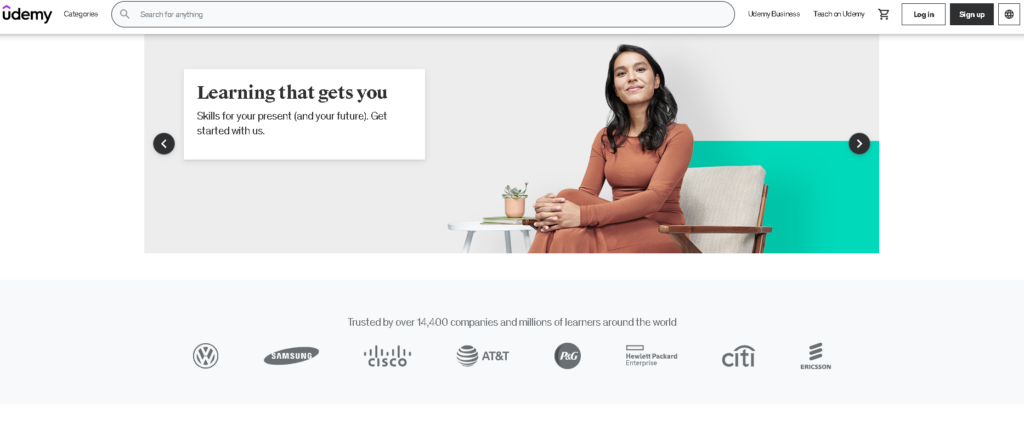
Udemy offers a vast selection of courses covering diverse subjects, making it accessible to learners with varied interests. Courses are typically budget-friendly, and once purchased, learners have lifetime access to the content. However, course quality can vary.
Pros
- Vast Course Selection: Udemy boasts an extensive library covering a wide array of subjects, making it suitable for learners with diverse interests.
- Affordability: Individual course prices vary, and Udemy often runs promotions, making it accessible for budget-conscious learners.
- Lifetime Access: Once you purchase a course on Udemy, you have lifetime access, allowing you to revisit and review course content.
Cons
- Course Quality Varies: Since anyone can become an instructor on Udemy, course quality may vary significantly.
Check out my articles on Udemy: Skillshare vs Udemy, Udemy vs Coursera, Udemy vs Udacity, Udemy vs LinkedIn Learning, Udemy vs Pluralsight, Udemy Alternatives, and more.
Pluralsight
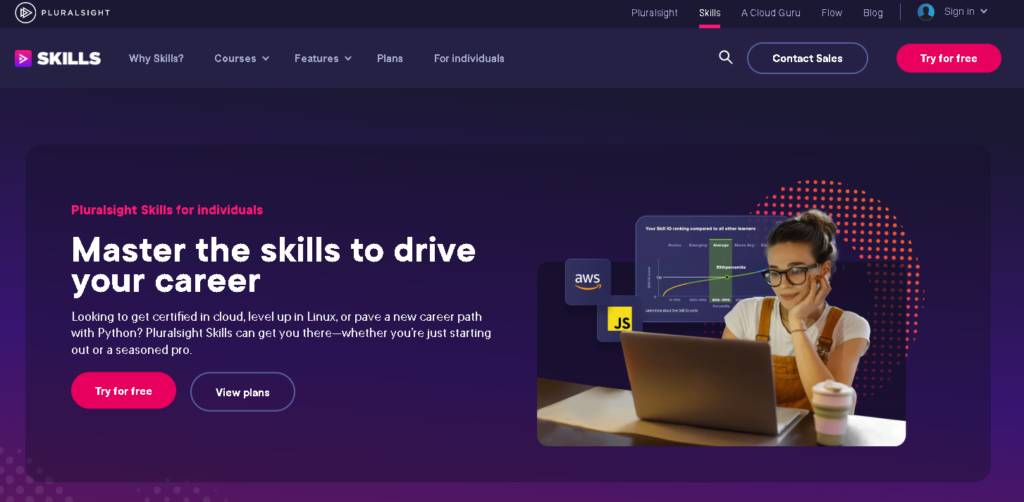
Pluralsight specializes in technology-related courses, catering to IT professionals and developers. It offers skill assessments and certification paths to help learners prepare for industry-recognized certifications, but its focus is niche to tech fields. Subscriptions can be comparatively higher in cost.
Pros
- Tech-Focused: Pluralsight specializes in technology-related courses, making it an excellent choice for IT professionals and developers.
- Skill Assessments: Pluralsight offers skill assessments to help learners identify their strengths and weaknesses, enabling targeted learning.
- Certification Paths: Pluralsight provides certification paths in various technology fields, helping learners prepare for industry-recognized certifications.
Cons
- Niche Focus: Pluralsight’s emphasis on technology may not cater to individuals seeking courses in other fields.
- Subscription Cost: While Pluralsight offers valuable content, its subscription cost may be higher compared to other platforms.
Quickly check out my article on Udemy vs Pluralsight for more information.
Udacity vs Coursera Certificates and Recognitions
Certificates and recognitions are crucial aspects of online learning, as they validate your skills and knowledge to potential employers or educational institutions. Let’s explore how Udacity and Coursera handle certificates and their respective recognitions.
Udacity Certificates
Udacity provides certificates upon successful completion of their courses and Nanodegree programs. These certificates carry weight in the tech industry, often recognized by leading companies.
Udacity’s focus on hands-on projects and practical skills means that employers value the skills demonstrated through their certificates.
However, it’s important to note that Udacity’s certificates may carry more weight in specific tech-related fields due to their industry collaboration.
Coursera Certificates
Coursera also offers certificates upon course completion. What sets Coursera apart is its partnership with renowned universities and institutions.
This affiliation lends credibility to Coursera certificates, as they bear the names of prestigious institutions. Coursera certificates can be particularly valuable in academic and research settings.
Additionally, Coursera’s Specializations and full-degree programs provide opportunities to earn recognized degrees, further enhancing their value.
Udacity vs Coursera Mobile Accessability
In today’s fast-paced world, mobile accessibility is a crucial factor in choosing an online learning platform. Both Udacity and Coursera recognize the importance of mobile access, but they approach it differently.
Udacity Mobile App
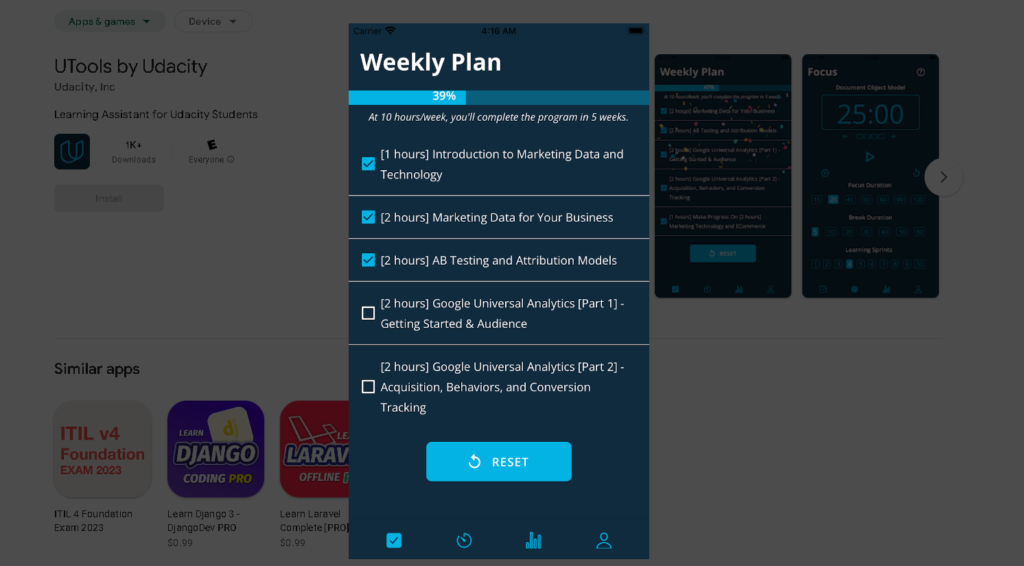
Udacity offers a mobile app available for both Android and iOS devices. The app allows learners to access course content, complete assignments, and interact with their learning communities on the go.
While the mobile app is functional and convenient, it’s important to note that not all Udacity courses are fully optimized for mobile use. The extent of mobile compatibility may vary from course to course.
Coursera Mobile App
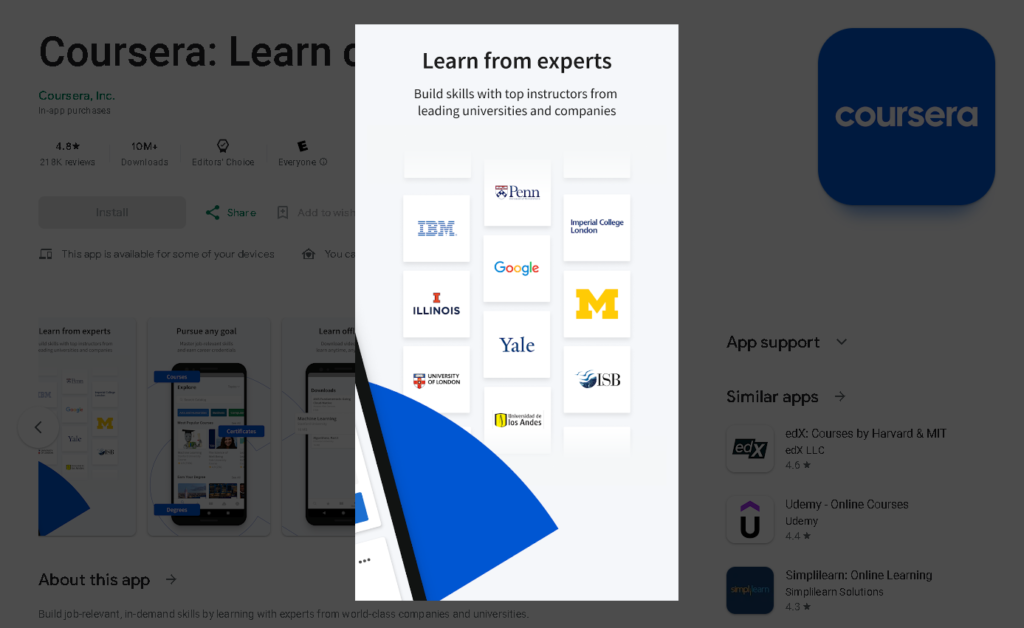
Coursera also provides a mobile app for Android and iOS users. The Coursera app is well-designed and user-friendly, offering an extensive library of courses and Specializations that are optimized for mobile devices.
Learners can access lectures, submit assignments, participate in discussions, and even download course materials for offline viewing. Coursera’s app is known for its smooth and seamless user experience.
Udacity vs Coursera My Personal Experience
As someone who has explored both Udacity and Coursera for online learning, I can provide valuable insights into my personal experiences with these platforms.
My Experience with Udacity
I found Udacity to be particularly beneficial for developing practical, industry-specific skills. The hands-on approach in Udacity’s courses, especially within their Nanodegree programs, allowed me to gain real-world experience.
The projects and assignments were challenging but rewarding, and you’ll feel well-prepared for the job market upon completion.
The mentorship offered in Udacity’s Nanodegree programs was a significant asset, providing guidance and support throughout my learning journey.
My Experience with Coursera
Coursera impressed me with its extensive selection of courses, covering a wide range of subjects and academic disciplines.
I appreciated the flexibility of choosing self-paced or scheduled courses to fimy t in my schedule.
The certificates from Coursera, often bearing the names of prestigious universities, provided a sense of accomplishment and recognition for my academic pursuits. I also found their Specializations valuable for in-depth learning in specific fields.
So, which platform is the Udacity vs Coursera winner? Udacity or Coursera?
Ultimately, the choice between Udacity vs Coursera should align with your personal goals.
If you’re seeking practical, job-specific skills and appreciate a hands-on approach, Udacity may be your top pick.
On the other hand, if you value a broader range of academic disciplines, university partnerships, and the flexibility to explore various subjects, Coursera may better suit your aspirations.
My advice is to consider your learning objectives and preferred learning style when making this decision, as both platforms have unique strengths that can contribute to a fulfilling educational experience.
Wrap Up
In the world of online education, the choice of Udacity vs Coursera represents a significant decision on your learning journey. Each platform offers its own set of advantages and considerations, making it crucial to align your choice with your individual goals and preferences.
If you’re looking to dive into specialized, hands-on learning with a focus on practical skills, Udacity’s Nanodegree programs and industry collaborations may provide the perfect path. Their career-focused approach, mentorship, and industry-recognized certificates can set you on a trajectory towards a successful career.
On the other hand, if you’re seeking a broader spectrum of academic disciplines, university-level courses, and the opportunity to earn certificates from renowned institutions, Coursera’s extensive course catalog and academic partnerships might be the better fit. Coursera’s flexibility in scheduling, financial aid options, and multilingual support further enhance its appeal.
But don’t forget that the educational journey is not confined to just two destinations. There are alternatives like Skillshare, Udemy, and Pluralsight, each with its unique strengths catering to diverse learning needs.
In the end, the best choice is the one that resonates with your goals, learning style, and the specific skills or knowledge you aim to acquire. Be sure to explore course reviews, free trials, and course previews to get a feel for the platform that suits you best. Whether it’s Udacity, Coursera, or another alternative, the pursuit of knowledge and personal growth is a journey that empowers you to shape your future. Happy learning!
Frequently Asked Questions (FAQ)
1. Which platform is better, Udacity or Coursera?
The choice depends on your specific learning goals. Udacity is ideal for practical, career-focused skills, while Coursera offers a broader range of academic disciplines and university partnerships.
2. Are Udacity and Coursera certificates recognized by employers?
Both Udacity and Coursera certificates carry recognition, but the value may vary depending on the industry and the specific course. Udacity’s certificates often hold weight in tech-related fields, while Coursera’s affiliations with universities enhance their credibility.
3. Can I access courses on Udacity and Coursera on my mobile device?
Yes, both platforms offer mobile apps for Android and iOS, enabling on-the-go learning. Coursera’s app is known for its user-friendly experience.
4. Are there alternatives to Udacity and Coursera?
Yes, several alternatives like Skillshare, Udemy, and Pluralsight offer unique strengths catering to diverse learning needs. Skillshare focuses on creative skills, Udemy offers a vast selection of courses, and Pluralsight specializes in technology-related learning.
If you want to check out more platforms to see which is best, please check out my other articles: Best Udemy Alternatives, Skillshare vs Udemy, Udemy vs Coursera, Udemy vs LinkedIn Learning, Udemy vs Udacity, Udemy vs Pluralsight, and way more.
5. How do I choose the right platform for my learning goals?
Consider your specific goals, preferred learning style, and the skills or knowledge you aim to acquire. Explore course reviews, free trials, and course previews to make an informed decision aligned with your objectives.
6. Do Udacity and Coursera offer financial aid or scholarships?
Yes, both platforms provide financial aid options to make education accessible to a broader audience. Eligibility criteria may apply.
7. Can I get a refund if I’m not satisfied with a course on Udacity or Coursera?
Yes, both platforms have refund policies. Udacity typically offers a 7-day refund window for Nanodegree programs and a 30-day refund window for individual courses. Coursera offers a 14-day refund policy for paid courses. Specific terms may vary based on the course and payment method.
8. Are Udacity and Coursera suitable for academic pursuits?
While both platforms offer academic courses, Coursera is often preferred for its university-level classes and academic partnerships. Udacity’s strength lies in practical, industry-specific skills.


Pingback: Pluralsight Alternatives: Are There Better Paths to Online Learning in 2023? - Leonard Vlooswijk
Pingback: Best Facebook Ads Courses in 2023 (Free & Paid): Your Roadmap to Mastering Marketing - Leonard Vlooswijk
Pingback: Coursera vs edX: Which Platform Wins the Battle of Online Learning in 2023? - Leonard Vlooswijk